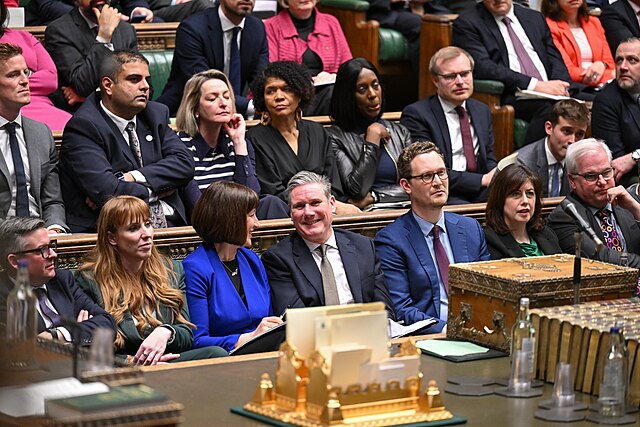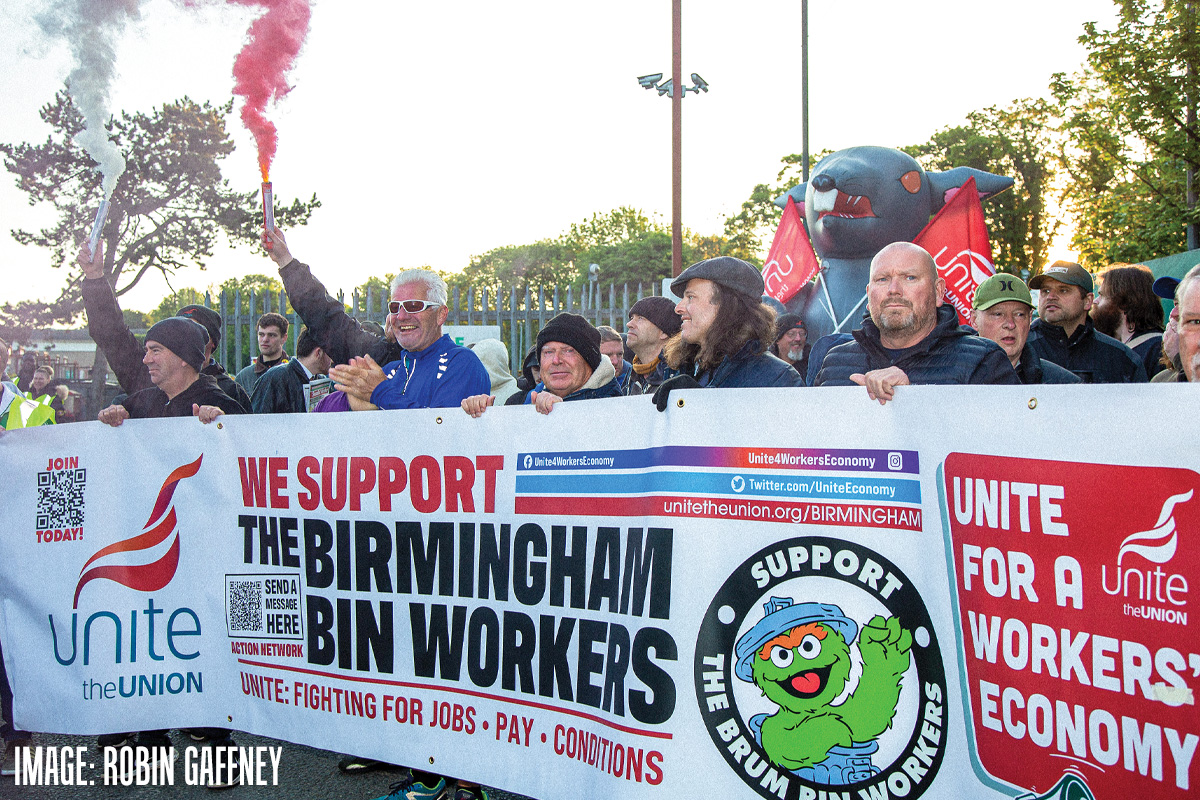Just one year into office, Starmer’s government lies bleeding – wounded by a revolt of Labour MPs.
The House of Commons provided the scene for this grisly massacre. During the course of yesterday’s debate, the government’s welfare bill was mauled to pieces by members of Starmer’s own parliamentary party.
The proposed legislation eventually passed, despite the opposition of 49 MPs from the Labour benches. But it was gutted of all its key measures in the process, as government ministers rolled out concession after concession, in order to avoid a devastating defeat.
Starmer may have technically won the vote. But this was almost the definition of a Pyrrhic victory. In fighting its own MPs, this crisis-ridden Labour government has sustained potentially mortal injuries.
Like a maimed animal, ‘Sir’ Keir Starmer may be able to limp on. But the Labour leader’s authority is now shredded. He and his government have been humiliated.
It is now only a matter of time before the lifeblood drains from this debilitated creature.
Workers and youth must organise to put Starmer and his establishment clique out of their misery.
Loyalists in revolt
News of a potentially damaging rebellion began to spread last week. At one point, over 120 Labour MPs were threatening to support a wrecking amendment, which would have destroyed Starmer’s welfare bill.
Under pressure from their constituents – including the hundreds of thousands of vulnerable people who would be affected by the proposed cuts to disability and pensioner benefits – even ‘moderate’ Labour MPs were raising their voices.

The aforementioned amendment, for example, was being pushed by Hackney South MP Meg Hillier, a right-winger who consistently fought against Jeremy Corbyn during his time as Labour leader.
Amongst the other ‘rebels’ were dozens of Starmer loyalists: MPs who had been carefully vetted by Labour HQ prior to the 2024 general election; chosen for their subservience to the party’s leadership, and then parachuted into constituencies.
Those mutinying, in other words, were not your typical ‘troublemakers’. But the scale and severity of the cuts being pushed by the Prime Minister and his Chancellor, Rachel Reeves, were too much for even these careerists to stomach.
These respectable ladies and gentlemen went into politics to gain a cushy job and feather their nests – not to be berated by enraged voters.
The mountain laboured…
The bullying tactics of Labour whips and the PM’s office – in particular Starmer’s Blairite chief of staff, Morgan McSweeney – only served to stir up an even greater opposition to Downing Street’s austerity agenda.
In turn, as the leadership began to budge, making U-turn after U-turn, appetite came with eating. Labour backbenchers sensed weakness and confusion, and began to ask further questions of the government’s legislation.
With fears that they could still be facing an embarrassing parliamentary defeat, Starmer and his ministers started removing central planks of the welfare bill. This included the most controversial cuts to disability benefits, based on changes to the eligibility criteria for those looking to claim Personal Independence Payments.
The government’s bill eventually passed last night with a majority of 75, by 335 votes to 260. But it had been eviscerated; shorn of any substance.
In the words of Aesop’s fable: the mountain laboured, uttering immense groans, only to produce…a mouse!
Weak and shaky
This parliamentary pantomime has opened up a Pandora’s Box for Starmer and Reeves. They are now faced with the worst of both worlds.
The Labour leaders have lost the trust and support of their own MPs, making further backlashes more likely down the line. At the same time, they have lost any credibility amongst Britain’s creditors, who are demanding that the government balances its books on the backs of the poor.
Since being elected, Starmer continually promised investors that his government would be ‘strong and stable’, offering a contrast to the political chaos of recent Tory administrations. But now this Labour government appears equally weak and shaky as its Conservative forerunners.

Following their various retreats, it is estimated that the government’s welfare ‘reforms’ will now provide none of the £5 billion in savings previously budgeted by the Treasury.
The Chancellor will therefore have to come back with further austerity measures to fill the fiscal hole in the public finances – but now without any political capital to push these past the Parliamentary Labour Party (PLP).
“You can’t spend the same money twice,” warned senior Labour minister Pat MacFadden, admonishing his mutinous colleagues. “So more money spent on welfare means less for some other purpose.”
In the absence of a clear socialist alternative, in other words, rebellious Labour MPs will simply have robbed Peter to pay Paul.
Dictatorship of capital
Alternatively, Starmer and Reeves might seek to break Labour’s manifesto promises regarding taxation. But the bankers and bosses are already raising a hue and cry about this possibility, warning that further costs on employers could deter investment and suffocate growth.
“Gilt investors wanted to see spending cuts,” stated Gordon Shannon, a fund manager in the City of London, speaking to the Financial Times. “Now the government’s only exit is tax rises, risking a death spiral of growth destruction.”
The bond markets have already moved against Britain, in response to yesterday’s pandemonium. This is a sign of the capitalists’ concerns about the UK economy, and about Labour’s capacity to carry through the cuts that the billionaires and big business require.
This demonstrates the antagonistic twin pressures bearing down on the Labour government: the dictatorship of capital, on one side, demanding austerity and attacks; and a radicalised working class, on the other, that refuses to pay for capitalism’s never-ending crisis.
The question then arises: what happens when the unstoppable force of the financial markets meets the immovable object of the working class?
The answer to this conundrum cannot be given in advance. All we can say for certain is that it is a recipe for social explosions and intensified class struggle.
Workers’ offensive
In the final analysis, the outcome will be determined by a struggle of living forces. And in this equation, the variable of leadership will prove essential and decisive.
When mobilised and organised, there is no force on Earth more powerful than the working class. Without this, however, as Marx said, workers are nothing but “raw material for exploitation” by the capitalists.

In particular, the trade unions must utilise the disarray in Starmer’s camp to go on the offensive.
Number 10 may well make a scapegoat of McSweeney, Reeves, or some other expendable cabinet minister. Rumours are already circulating about the Chancellor’s future, for example, after Starmer appeared to throw her under the bus at Prime Minister’s Questions today.
But this is not enough. Heads should roll. What is required, however, is more than a tokenistic changing of the guard. We need a fight against the entire capitalist establishment and its Dickensian programme.
For militant mass action
The Birmingham bin workers have shown the way: organising months of militant action against austerity.
This inspirational struggle should now be broadened out, with mass coordinated action across the public sector – in every hospital, school, and council – in defence of jobs, wages, and services; against privatisation and outsourcing; and for a socialist alternative to capitalism’s savage cuts.
Such a campaign must be built on bold political foundations. This means going beyond mild reformist demands to ‘tax the rich’, which fall far short of what is required.
Instead, the left and the labour movement must fight for the expropriation of the bankers, bosses, and billionaires; for the nationalisation, without compensation, of all the major monopolies; and for democratic socialist planning in place of the anarchy and madness of capitalism.
No trust in Starmer’s Labour
Above all, in this battle, workers and their communities must trust only in themselves and their own strength.
The bulk of the PLP are nothing but careerists. They have no genuine concern for the lives and livelihoods of workers, the poor, and the vulnerable – only for keeping their seats.

The brutal impact of austerity on ordinary people is only a cynical afterthought for these besuited politicians. What really occupies their minds is the electoral threat posed by the rise of Reform UK.
Increasingly, Nigel Farage is outflanking Starmer to the left on economic questions: opposing the cuts to the winter fuel allowance; pledging to scrap the cap on child benefits; and calling for the nationalisation of Britain’s dilapidated steel and water industries.
On this basis, Reform have been winning over disenchanted working-class voters, and making inroads into Labour’s former heartlands. And this has set off alarm bells in Westminster.
Hence the recent parliamentary revolt, with backbench MPs reaching for the life rafts, in order to avoid going down with Starmer’s sinking ship.
Wolf in sheep’s clothing
At the same time, the left must be wary of wolves in sheep’s clothing.
Opportunists like Andy Burnham, for example, have been vocal recently in their opposition to the Labour leadership’s austerity drive.
The Manchester Mayor no doubt spies a chance here to buff his ‘left’ credentials in advance of a potential leadership contest, and thereby secure the unions’ support in any race to decide Starmer’s successor.
But Burnham is no friend of the working class. He has used his platform in Manchester primarily to advance his own career, not the interests of workers. And if elected as Labour leader, he would continue defending the status quo, not fight for genuine socialist policies.
For info:
I promised the Greater Manchester Disabled People’s Panel that I would represent their opposition to this Bill all the way to the end and that is exactly what I am doing.
My job. 👍🏻
— Andy Burnham (@AndyBurnhamGM) July 1, 2025
Crisis of capitalism
It is too early to say exactly what will happen next. We do not have a crystal ball. And there is little to be gained from speculating.
What is clear is that, after only twelve months in power, Starmer’s big business government is already entering its death agony.
This existential political crisis for Starmer is a reflection of the deepening crisis of British – and world – capitalism.
The problem for the government is not simply one of ‘poor communication’ and ‘bad management’, as some superficial bourgeois commentators have suggested.

The impossible contradiction the ruling class and its representatives face is that the cupboard is bare. The capitalist system has reached a dead end.
As the Prime Minister’s Tory predecessors – from May to Johnson; Truss to Sunak – experienced for themselves, anyone who seeks to uphold this rotten system will find themselves crushed, as the old order cracks and crumbles.
The only solution is to topple this entire decrepit edifice, and throw out all those who defend it.
Revolution against the billionaires
From day one, the Marxists of the RCP predicted that this Labour government, despite its supposed ‘supermajority’, would prove to be a government of crisis; that there would be no honeymoon period for Starmer, only one painful, traumatising shock after another.
Every dot and comma of this perspective has subsequently been borne out by events.
From last summer’s far-right rampage; to the panic on the bond markets; to the collapse of British Steel; to the fracturing of the political landscape seen in May’s local elections; to the turmoil of Trump’s trade war; to the widening conflagration in the Middle East: Starmer’s government has been continually thrown from pillar to post – just as we forecast.
This demonstrates the power of the Marxist method, which alone can provide the “advantage of foresight over astonishment”, as Leon Trotsky aptly remarked.
The task now is to prepare for the turbulent new chapter that is opening up in front of us: a period of sharp turns and sudden changes; of revolutionary upheavals; and of radicalising consciousness.
That means redoubling our efforts to strengthen the forces of communism; to organise workers and youth in the fight for revolution against the billionaires; to build the RCP.






